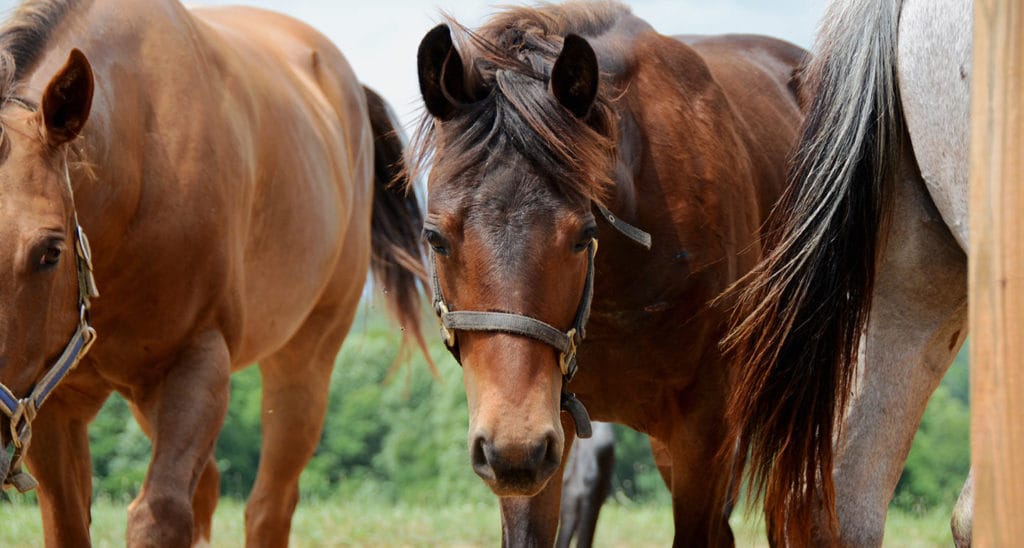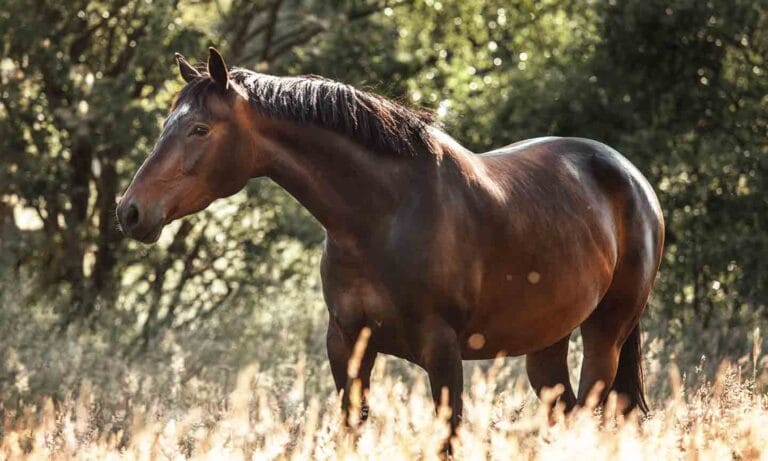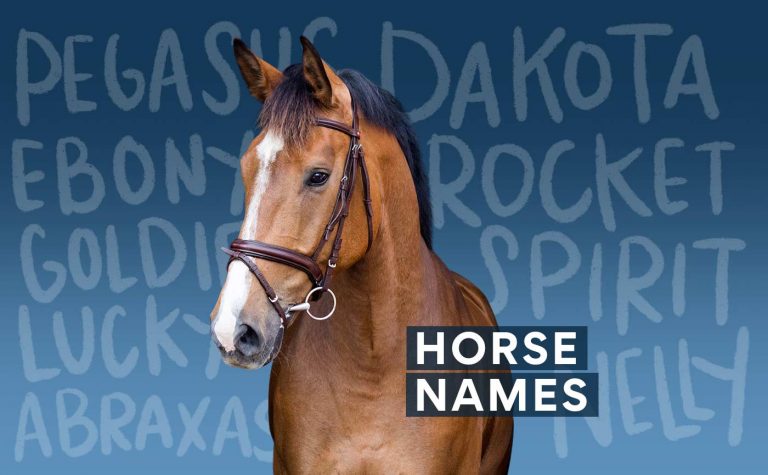There’s a lot that goes into caring for a horse. You’ll have to decide where to house them, who will tend to their medical needs and their hooves, how much riding you’ll do, the type of feed you’ll give to them, and a host of other questions—ones you’ll have to consider throughout the life of your horse. So it’s natural for horse parents to wonder: Just how long do horses live?
Horse lifespans depend on a variety of factors, ranging from diet to exercise to illness and beyond. Making the right choices for your horse can be daunting! But as a good horse parent, you want to make sure you’re taking the best care of your four-legged companion so they can live to a ripe old age in good health.
How Long Do Horses Live?
Before you find out how to help your horse live longer, it pays to know what the average lifespan of a horse is.
“The average domestic horse lives something like 25 to 30 years,” says David Ramey, DVM, owner of Ramey Equine in Los Angeles and author of books, including “The Concise Guide to Medications, Supplements and Herbs for the Horse.”
Dr. Ramey sees all types of horses, from show and performance breeds to pets. Of course, he says, 25 to 30 years is the average lifespan of a pet horse, and that makes a difference.
“Domestic horses that are cared for as pets probably have the best chance of living a long time, since they don't have to worry about access to feed and they usually have regular care,” Dr. Ramey says.
A racehorse, on the other hand, will probably have a shorter life—not because Thoroughbreds aren’t well cared for but because they have many life-ending traumas. A broken leg, for instance, can lead to euthanization in the racehorse world, Dr. Ramey says.
Does breed determine how long horses live? No, Dr. Ramey says. But while the breed of horse won’t make a difference in horse lifespan, at least as far as the data shows, Dr. Ramey says smaller horses like ponies do tend to live longer than average-sized horses. And the record for the longest living horse was one in the U.K. who lived to be 62.
So, what goes into a horse’s longevity?
“It’s, as veterinarians say, ‘multi-factorial.’ Genetics, feed, luck, level of activity and good care all play a role,” Dr. Ramey says.
How to Help Your Horse Live Longer
Good nutrition, attention to health as needed, socialization with other horses and regular exercise: These are the cornerstones of good equine health, Dr. Ramey says. That may sound simple, but these guidelines are often overlooked, he says—and that can affect how long horses live. Follow the tips below to help your horse live their fullest life.
Feed Your Horse Often, Not Too Much at a Time
In the wild, horses are grazers, eating small amounts of grass and other plants to keep them healthy, Dr. Ramey says. Of course, you can’t replicate the wild, but here’s how you can get close—and keep from overdoing the calories so your horse stays at a healthy weight. That is one way to prolong a horse’s lifespan.
- Get the right kind of food. Dr. Ramey suggests feeding your horse mostly forage—pasture grasses and long-stem hay like alfalfa. You want to avoid giving your horse grains like oats and corn unless your pet needs the concentrated calories: if they’re a growing colt, or if they’re nursing and need extra calories to produce milk.
- Feed your horse at least twice a day. And that’s the minimum; it’s better to feed your pet at least three times a day to come close to that perpetually grazing pattern in the wild, Dr. Ramey says, and if your horse is put out to pasture, that’s ideal. But if not, you can get a slow feeder for your horse. Feeders like Derby Originals Supreme Four Sided Slow Feed Hay Bag have small openings so the horse can eat bits of hay at a time, which is similar to foraging in a pasture.
- Don’t overdo the calories. Most pet horses are overweight, a combination of too much food and not enough exercise. Of course, counting calories is tough, so here’s an easier way to calculate the right amount of food: Your horse needs between 1.5 and 2 percent of their body weight per day in feed. “If you have a horse that weighs 1,000 pounds, that horse is going to need 15 to 20 pounds of feed a day,” Dr. Ramey says. Another way to tell if your horse is at a healthy weight? If you can feel his ribs, but not see them, Dr. Ramey says.
Take Care of Your Horse’s Health
Horses can suffer from a variety of illnesses, some of which can be prevented by making sure your pet gets vaccinations on schedule, gets dewormed if they need it, and that their teeth and hooves are taken care of. Setting up a good relationship with a vet and farrier are key, Dr. Ramey says. Even so, your pet can still get the following common diseases, which can sometimes cut short the average lifespan of a horse:
- Colic: Horses who aren’t eating the right kind of feed can get abdominal pain. To prevent this, Dr. Ramey says, feed your pet frequently; don’t feed much, if any, grain; and make sure they get regular exercise.
- Laminitis: Although this painful disease affects your horse’s hooves, some of its causes have to do with what your horse eats. Don’t overfeed them, go easy on the grain and treats, and don’t let your horse get overweight, Dr. Ramey says.
- Other hoof problems, like thrush or abscesses: You, along with a vet or farrier, should be paying attention to your horse’s hooves to make sure they’re OK, Dr. Ramey says. Then follow any recommendations for trimming and/or shoeing to keep their hooves in good health.
- Arthritis: “No one knows how to prevent arthritis, but regular exercise is important,” Dr. Ramey says.
Make Sure Your Horse Moves
“It’s not the intensity of exercise that's really all that important. It’s just the ability to move,” Dr. Ramey says. So, what does that mean in real life for horse parents?
Well, if you lunge your horse about 20 minutes a day, go on a trail ride, and leave them in a big pen during the day and the stall at night, that would be great. Even better, says Dr. Ramey: Lunge your horse twice a day for 20 minutes, ride them morning and night, and then leave them in a big pen the rest of the time (preferably with their horse buddies) until they go into the stable at night.
Of course, if you board your horse, the boarding staff should make sure to give your horse the exercise they need. Not only will that keep their body in good working condition, it can prolong your horse’s lifespan.
Give Your Horse Time With Their Equine Friends, and You
Horses like to live together—after all, they’re herd animals.
“In stalled situations, it seems to be particularly helpful to let horses be able to see each other—so that means a place where they can hang their heads out of the stall,” Dr. Ramey says.
If your horse has a couple of companions that they like to hang out with, by all means put them out to graze together. It’s good for horses to hang out with their friends, though you do want to avoid putting two strange horses together in case they don’t get along or one wants to boss the other around.
That said, horses also need time with their caretakers. So, spend a while grooming your horse, petting them and telling them what a great pet they are, Dr. Ramey says.
All these things are necessary for your horse’s well being, mental and physical, so they can live a happy, healthy life no matter what the average lifespan of a horse is. But there’s another reason to take care of the basics, Dr. Ramey says: “It’s extremely rewarding because what you end up with is a wonderful relationship with an animal that has served people like no other through the course of history.”
Share:










